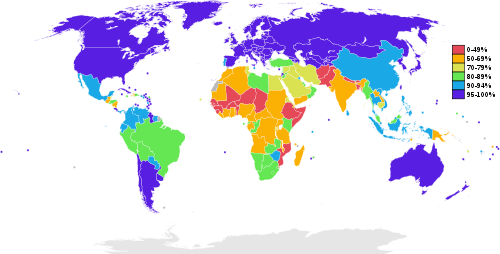A major problem that we face when trying to bring about peace around the globe is education levels in developing and war torn countries. One way to measure this is by looking at the adult literacy rates, then comparing the rates to other countries.
 |
| Literacy Rates by country |
The results we see are not promising. Countries in the Middle East have literacy rates significantly lower than those of developed and even developing nation, especially for women. This translates into fewer opportunities for members of those societies. Without strong educational institutions, the youth in Middle Eastern and North African Countries have few opportunities to advance themselves, leading to rampant unemployment.
So how does this affect our foreign policy?
In order to promote peace throughout the world, we must promote literacy and education. Young, educated people are forces of change throughout the world. By providing an education to lower class women, we can empower them more than ever before. Instead of using bombs, we ought to use books to create a new global policy. The Middle East has extreme poverty and although we may not think it is our problem, we need to make it our problem. It is much more effective to bring up a country through education than to use crash and burn tactics of military action.
The United States must work with other countries to promote more NGOs to work inside these countries to promote education reform. They must work with local governments to provide funding for schools. Additionally, we must open our own doors to these young people who wish to pursue a higher education within the United States. Politicians at home may not appreciate this policy, but it is much better in the long run to pursue a strategy of youth empowerment than to simply use military action. We need to pursue a foreign policy of inclusion if we are to bring about peace in the Middle East, not one of exclusion.

